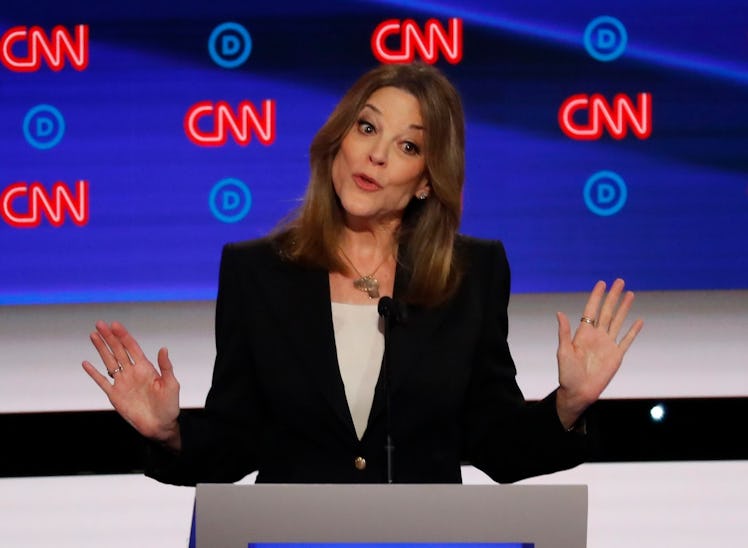
Twitter Can't Stop Joking About Marianne Williamson At The Democratic Debate
The Democratic National Convention may still be nearly a year away, but that hasn't stopped the 2020 Democratic presidential candidates from passionately defending their policy proposals and challenging their opponents. Tuesday, July 30, marked the start of the second round of Democratic debates, and candidates discussed everything from immigration to health care. Tuesday night's debate was littered with memorable moments, but right from the start there was one candidate on everyone's minds. Seriously, these tweets about Marianne Williamson at the July 30 Democratic debate are speculating about all the possibilities under a Williamson presidency, or even just her best debate topics.
Williamson, a self-help author and spiritual adviser, is not exactly a traditional presidential candidate. (Which, to be fair, is not as big a problem in the 2020 election cycle as it may have been in previous years, considering current President Donald Trump did not have any political experience before entering office.) But her non-traditional background has left her struggling to get voters to take her seriously. Twitter users have mocked her statements on spirituality, and many of her old tweets criticizing vaccines and antidepressants have resurfaced, often to significant criticism. Tuesday night's debate was no different; there were a variety of tweets joking about Williamson and her "crystal energy."
Williamson has previously defended herself and her campaign against suggestions of frivolity or lack of qualification. During a July 30 interview with Hill.TV that aired ahead of Tuesday night's debate, Williamson challenged what she described as the "false narrative" about her being "the ‘crystal lady,’ ‘wacky new-age nutcase.’"
“The establishment media sees me as a real threat to the status quo,” Williamson said. "If you really think about it, I must be doing something right that they’re so scared."
Her response, however, didn't stop Twitter users from making comments about Williamson's "crystal energy" and and her resemblance to a "Kristen Wiig character from 2010."
A lot of people really wanted the moderators to give her more time. Williamson definitely has some stans out there.
And a lot of people just really, really wanted to imagine a Williamson presidency.
Williamson also got some cheers for some of her responses, including an answer to a question about the Flint, Michigan, water crisis which highlighted the racial aspect of the ongoing lack of fresh water in the city. "We have communities, particularly communities of color and disadvantaged communities, all over this country, who are suffering from environmental injustice. I assure you, I lived in Grosse Pointe. What happened in Flint, would not have happened in Grosse Point." People of color constitute more than 60% of the Flint population.
Twitter also gave Williamson high marks for her answer to a question about reparations for slavery, calling it "payment for a debt that is owed."
"We need to recognize that when it comes to the economic gap between blacks and whites in America, it does come from a great injustice that has never been dealt with," she said. "That great injustice has had to do with the fact that there was 250 years of slavery, followed by another 100 years of domestic terrorism."
With such a crowded field of candidates all espousing various degrees of centrist and progressive policy, it was no wonder that there were several heated exchanged throughout the night. But even as candidates discussed immigrant family separations and universal health care, many Twitter users were more interested in what Williamson had to say. After Warren and Sanders tore into former Maryland Rep. John Delaney and other candidates on the merits of Medicare for All, social media users speculated on how Williamson would respond.
When Williamson finally did speak, she expressed concern that focusing so much on health care would "make it harder to win" and "make it harder to govern."
To finalize lineups for the Democratic debates on July 30 and 31, CNN conducted live drawings from three tiers of candidates. According to CNN, the logic for this was simple: They wanted each debate to feature five of the lower-ranking candidates in the polls, three middle candidates, and two top candidates. That way, CNN was able to avoid having one night heavily stacked with frontrunners.
On July 30, which was the first of two back-to-back debates, Vermont Sen. Bernie Sanders and Massachusetts Sen. Elizabeth Warren were allies on key issues in a highly anticipated progressive matchup. The debate also featured candidates such as Mayor Pete Buttigieg of South Bend, Indiana, Minnesota Sen. Amy Klobuchar, and former Texas Rep. Beto O'Rourke. There was only one minor difference between the roster for this round of debates and the last one. Since the last debates, California Rep. Eric Swalwell decided to end his presidential bid. As a result, Montana Gov. Steve Bullock became the 20th candidate to qualify for the second round of debates.
Tuesday night's debate may have had several memorable moments, but there will be more to look forward to on Wednesday. The second night of this round of debates will feature frontrunners such as former Vice President Joe Biden and California Sen. Kamala Harris, who faced off during the last debate on the subject of school desegregation and busing.
On Wednesday night, Harris and Biden will come face-to-face again, along with former Housing and Urban Development (HUD) Secretary Julián Castro, New York Sen. Kirsten Gillibrand, and New Jersey Sen. Cory Booker. The second debate will also include former tech executive Andrew Yang, who claimed that his microphone was turned off for a significant portion of the last debate.
As fiery as the first debate was, the drama's not over. See you all back here Wednesday, and don't forget the popcorn.